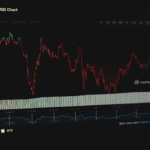Decentralized Finance (DeFi) is evolving from an experimental frontier to a legitimate component of institutional finance. Traditional financial institutions (TradFi) are now entering the DeFi space not just as observers but as active participants, bringing compliance, risk management, and large-scale capital. This shift marks the rise of institutional-grade DeFi, where traditional structures intersect with blockchain-based innovation. As more institutions engage with decentralized finance, skepticism around volatility and regulatory uncertainty is being met with data-backed confidence, growing political support, and real-world applications.
The Institutional Entry into DeFi
In 2023 alone, institutional investment in blockchain-based finance surged. According to Galaxy Digital, over $9 billion in institutional capital flowed into DeFi protocols, with a significant portion dedicated to digital asset investment solutions and crypto asset management infrastructure. These numbers highlight a strong pivot from speculative to strategic use cases. Firms like J.P. Morgan, BNY Mellon, and Fidelity have developed or tested DeFi applications, often in collaboration with blockchain and digital asset strategy consulting firms.

For example, J.P. Morgan’s Onyx platform executed its first DeFi trade on the Polygon blockchain in late 2022 as part of the Monetary Authority of Singapore’s Project Guardian, a regulated pilot to explore real world DeFi investment consultants and tokenized asset exchanges. These moves are no longer theoretical experiments—they signal a broader transformation in capital markets.
Compliance and Institutional Requirements
The primary barrier for traditional firms engaging in DeFi has always been compliance. However, with the emergence of digital asset consulting for compliance, institutions are now able to build secure, compliant bridges to decentralized networks.
Protocols are adapting too. DeFi platforms like Aave Arc and Compound Treasury offer permissioned environments specifically designed for institutions, featuring KYC, AML procedures, and risk assessments—aligning with the demands of real-world assets on chain investment consultants and regulatory bodies alike. These platforms demonstrate that decentralization can coexist with regulatory discipline.
Political and Regulatory Support
Regulatory frameworks are evolving to support responsible innovation. The European Union’s MiCA regulation, passed in 2023, includes provisions for stablecoins and DeFi service providers, while countries like the UAE and Singapore are positioning themselves as global hubs for regulated digital asset activity. This progress is being closely followed by stablecoin and security tokens investment consultants, who assist institutions in navigating compliant pathways into the space.
In the U.S., while the regulatory environment remains fragmented, the introduction of bipartisan bills like the Digital Commodity Exchange Act (DCEA) suggests growing political will to establish clear guidelines. Influencers such as Caitlin Long, CEO of Custodia Bank, argue that regulated DeFi can offer greater transparency and efficiency than traditional financial services—a perspective increasingly echoed by cryptocurrency investment consultants and institutional thought leaders.
Tokenization and Yield Opportunities
One of the most compelling use cases for institutions is RWA tokenization—bringing real-world assets like bonds, invoices, and commodities onto blockchain rails. Asset managers are leveraging RWA tokenization investment consultants to unlock liquidity and programmable yield through DeFi real world assets investment consultants. These consultants are pivotal in constructing frameworks that make tokenized treasuries or bond-backed stablecoins compliant and attractive to institutions.

This approach creates opportunities for portfolio management consultants and digital asset management companies to integrate blockchain-native yield with traditional investment analysis and portfolio management strategies. Products such as tokenized money market funds, powered by smart contracts, allow institutions to earn real yield in a decentralized environment with fully auditable on-chain records.
Build Your DeFi Knowledge
Curious about how traditional finance and digital assets are converging? Kenson Investments offers accessible educational resources designed to help you understand the mechanics, risks, and innovations driving institutional-grade DeFi. Start learning at your own pace and stay informed as the future of finance unfolds.
Disclaimer: The information provided on this page is for educational and informational purposes only and should not be construed as financial advice. Crypto currency assets involve inherent risks, and past performance is not indicative of future results. Always conduct thorough research and consult with a qualified financial advisor before making investment decisions.
“The crypto currency and digital asset space is an emerging asset class that has not yet been regulated by the SEC and US Federal Government. None of the information provided by Kenson LLC should be considered as financial investment advice. Please consult your Registered Financial Advisor for guidance. Kenson LLC does not offer any products regulated by the SEC including, equities, registered securities, ETFs, stocks, bonds, or equivalents”














